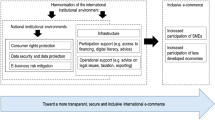Abstract
The rapid development of the digital economy has prompted a global demand for e-commerce or digital trade rules and has also made the negotiation and formulation of rules in this field a major issue. Regionally and bilaterally, the digital trade rules dominated by the United States have been expanded through the Trans-Pacific Partnership, and a set of rule templates have been formed through the Comprehensive and Progressive Agreement for Trans-Pacific Partnership and the United States-Mexico-Canada Agreement. At the level of the WTO multilateral system, the negotiation of e-commerce rules is also an important matter of WTO modernization reform. Based on the proposals of members, a draft of the WTO e-commerce consolidated text was formulated at the end of 2020. Due to differences among members regarding rules such as cross-border data flow, digital platform responsibility and facility localization, a common text is far from being agreed upon. Digital economic activities rely on the internet and information technology and are not bound by physical borders. In view of the importance of digital economic activities to the global economy, in order to smoothly develop digital trade and e-commerce activities, there is a need for an interconnected and integrated rule system. The negotiation of e-commerce rules in the WTO seems to be a hopeful sign. Therefore, to help bring this hope to fruition, this paper will start from the WTO’s consolidated text on e-commerce, combine the proposals of members and the regional and bilateral development of e-commerce and digital trade rules, analyze consensuses and differences among members, and explore a progressive approach, exception clauses, etc. to promote a globally unified, transparent and fair rule framework.
Jie Yang is a fellow of the Law & Policy Analysis Department at the Shanghai WTO Affairs Consultation Center; Huiling Lin, PhD, is director of the Law & Policy Analysis Department at the Shanghai WTO Affairs Consultation Center.
Access this chapter
Tax calculation will be finalised at checkout
Purchases are for personal use only
Similar content being viewed by others
Notes
- 1.
See Gary Clyde Hufbauer and Megan Hogan, Digital agreements: What’s covered, what’s possible | PIIE, Policy Brief 21–22, October 2021, available at: https://www.piie.com/publications/policy-briefs/digital-agreements-whats-covered-whats-possible, 14th December 2021 last visited.
- 2.
See USMCA Art. 19.8(3): “The Parties recognize that pursuant to paragraph 2, key principles include: limitation on collection; choice; data quality; purpose specification; use limitation; security safeguards; transparency; individual participation; and accountability. The Parties also recognize the importance of ensuring compliance with measures to protect personal information and ensuring that any restrictions on cross-border flows of personal information are necessary and proportionate to the risks presented.”
- 3.
See TPP Art. 14.11(1): “The Parties recognise that each Party may have its own regulatory requirements concerning the transfer of information by electronic means.”
- 4.
Tang Yang, Wu Yue, Dong Xiaoying, “Development Trend of Global Digital Trade Rules and China’s Basic Countermeasures”, Journal of China Internet, volume 3, pp. 12–17, 2022.
- 5.
UNCTAD database, Data Protection and Privacy Legislation Worldwide, available at https://unctad.org/page/data-protection-and-privacy-legislation-worldwide, 26th April 2022 last visited.
Author information
Authors and Affiliations
Corresponding author
Editor information
Editors and Affiliations
Rights and permissions
Copyright information
© 2023 The Author(s), under exclusive license to Springer Nature Singapore Pte Ltd.
About this chapter
Cite this chapter
Yang, J., Lin, H. (2023). Divergences in WTO E-commerce Negotiations and Promotion Paths. In: Zhang, L., Tan, X. (eds) A Chinese Perspective on WTO Reform. Springer, Singapore. https://doi.org/10.1007/978-981-19-8230-9_4
Download citation
DOI: https://doi.org/10.1007/978-981-19-8230-9_4
Published:
Publisher Name: Springer, Singapore
Print ISBN: 978-981-19-8229-3
Online ISBN: 978-981-19-8230-9
eBook Packages: Law and CriminologyLaw and Criminology (R0)




